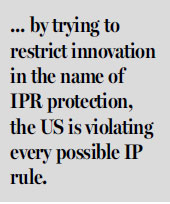US tariffs can't stop China's IP progress
Using the excuse of protecting US intellectual property, the Donald Trump administration has imposed stiff tariffs on imports from some of its trading partners and strict restrictions on foreign companies, particularly those from China. But far from benefiting the US economy, these protectionist policies are hurting it, as well as undermining international rules on innovation and intellectual property rights (IPR) protection.
The US used to be a defender of innovation-oriented IPR protection and international rules, which are the cornerstone of economic globalization. In fact, it was the US that prompted the inclusion of IPR protection into the World Trade Organization's Trade Related Intellectual Property System despite the opposition of developing countries, claiming it was good for innovation. Since then, all countries have strictly followed one rule: to regard any unilateral investigation beyond the WTO mechanism as a violation of international rules and other countries' sovereignty. Indeed, the TRIPS-based IPR protection and transfer helped boost global innovation and stabilize the world economy.

The Trump administration's protectionist policies and investigations under Section 301 of the Trade Act of 1974 have also violated international laws and harmed the global economy, even tarnished the US' image. Since the US promised to settle trade disputes using WTO rules, it is breaking its own promise as well as destabilizing the global economy and global governance by launching the Section 301 investigations.















